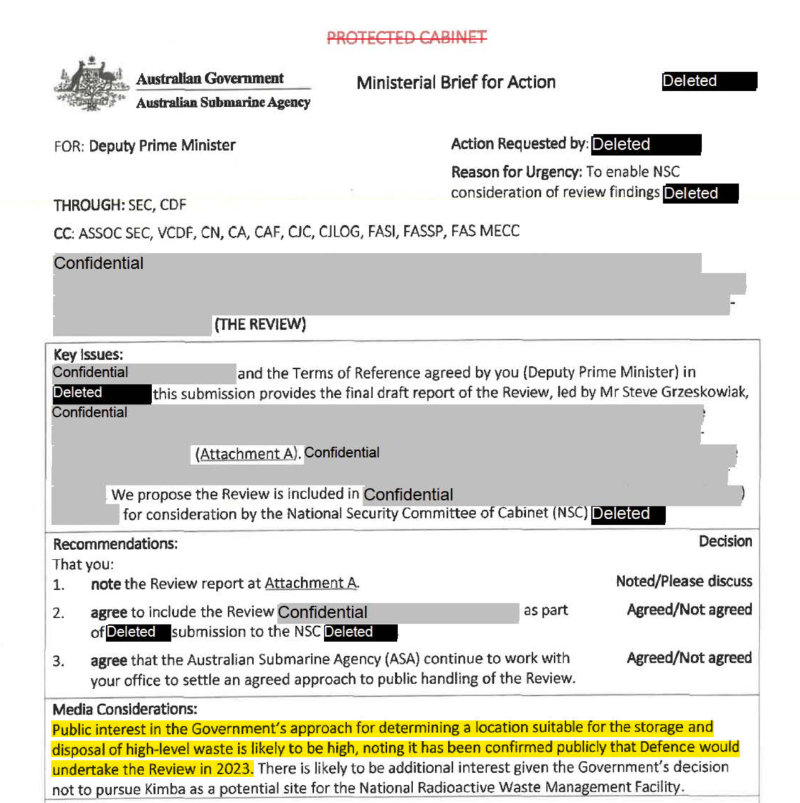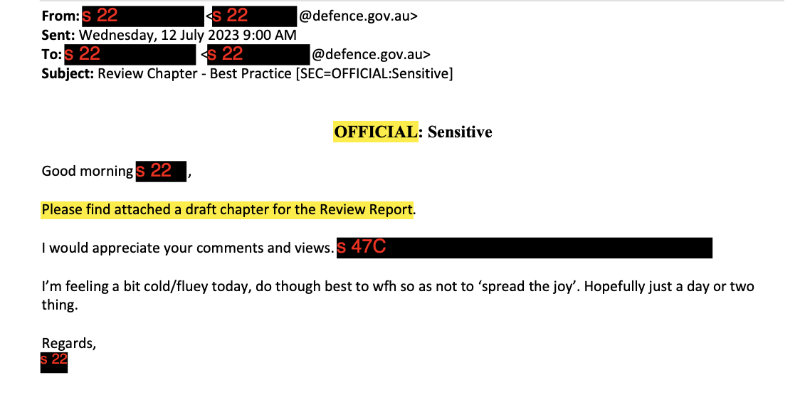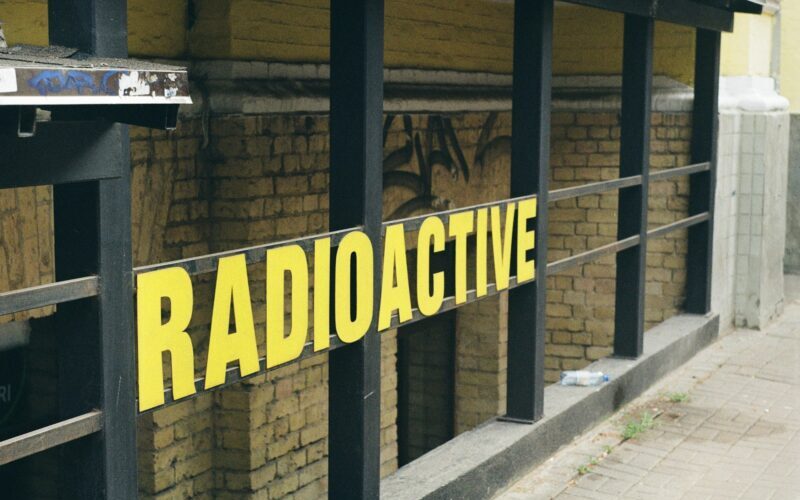Where to store nuclear waste from AUKUS submarines is a decision which will impact us for millennia, but they are going to extraordinary lengths to hide it from the public. Rex Patrick reports.
Somewhere deep inside a locked government filing cabinet within Australia’s labyrinthine Defence bureaucracy, there’s a document intended to advise the Government on what locations in Australia might be suitable to store high-level nuclear waste and how to select one of those locations.
It’s a roadmap to where the most toxic material on our planet may be dumped for tens of thousands of years. The report itself is just paper, but it’s red hot. It’s politically radioactive.
The document in question is the result of a $360,000 February 2023 contract to a company called SG Advice. The principal of SG Advice was tasked with coordinating the Australian Nuclear Science and Technology Organisation, the Australian Radioactive Waste Agency, the Australian Submarine Agency, Defence, and Geoscience Australia to produce a “significant piece of policy advice” for the government.
Nuclear waste. Fifty years of searching, still nowhere to dump it.
The document is being held secret despite the obvious fact that a decision on a location for a high-level nuclear waste facility will be a decision with impacts which will last for millennia.
The government doesn’t want the public to see it – it’s just too controversial. All the more reason then for me to seek access to it using our Freedom of Information laws.
A Cabinet document
When I requested the report, the newly minted Submarine Agency told me I couldn’t have it because it was a cabinet document. But when I thought about the nature and purpose of the report, this didn’t make sense.
The Cabinet Handbook, the authoritative rules governing all matters relating to Cabinet, states that “… Cabinet documents are … not the property of … [the] department. Access to them by succeeding governments is not granted …”
If this ‘significant piece of policy work’ dealing with the problem of high-level nuclear waste in a multi-decade program was a Cabinet document, it would only be available to the Department for the period that the Albanese Government was in power. If there was a change of Government, the work that was done would go into the archives and would not be available for reference by future governments, at least not for 20 years. So, the nuclear waste planning would have to be revisited from scratch.
But the Submarine Agency went to the Administrative Review Tribunal with its taxpayer funded lawyers to argue that the report was a Cabinet document and consequently must remain secret.
Government Ministers and bureaucrats love Cabinet-in-confidence exemptions because if they’re upheld, it’s ‘all over red rover’ as far as any public access is concerned. First Assistant Director-General of the Submarine Agency, Alexandra Kelton, deposed:
… my understanding at all times was that the final Review report would be a document submitted to the [National Security Committee of Cabinet] for its consideration.
If it was intended for Cabinet, then the Submarine Agency had engaged in wasteful administrative folly.
Document purpose
In order for the Tribunal to find that the report was a Cabinet document, it needed more than just evidence that it has been to Cabinet. The FOI Act demands that the Agency must show, with probative evidence, that the report was
brought into existence for the dominant purpose of submission for consideration by the Cabinet.
The only evidence before the Tribunal that the document was born with Cabinet submission in mind was in the $360,000 contract to SG Advice Pty Ltd which stated, “Any decision related to locations for the storage and disposal of radioactive waste is a decision for the Australian Government.”
Ms Kelton deposed, “The capitalised reference to ‘Australian Government’ in the [contract] is synonymous with Cabinet. That is a common expression in Defence and [the Submarine Agency] when referring to Cabinet.”
Instead of using the word ‘Cabinet’, Ms Kelton used the broader multi-definitional word “Australian Government”. She could have used “Cabinet” but she chose to be ambiguous.
The contract to commence the report was signed in late February 2023. The report was completed in November 2023. Only after the document was finalised was it sent to the Defence Minister, suggesting it should go to Cabinet. In the covering brief, the Submarine Agency raised the political sensitivity of the content of the report.

Recommendation that the Report be Taken to Cabinet (Source: Defence)
Despite the attempt by the agency to wrap the report in a 20-year-long secrecy blanket, it’s likely the Tribunal will rule in my favour and we will all get to see the report. It should not otherwise be kept secret.
Reckless conduct
The Submarine Agency will bear the ultimate responsibility for Australia’s nuclear stewardship under the AUKUS agreement and in relation to our nuclear non-proliferation obligations with the International Atomic Energy Agency. Those stewardship obligations include commissioning, operating, maintaining, and decommissioning reactors and disposing of their high-level waste.
The Submarine Agency promotes the idea that it will manage all nuclear activities safely, informed by international best practices. Yet its approach to the nuclear waste report shows otherwise.
If we indulge the Submarine Agency for a moment and believe that the nuclear waste report was for Cabinet, their conduct and care of this report has been reckless.
They’ve been playing fast and loose with rules that are laid down at the highest level of the Australian Government; rules approved by Prime Minister Albanese and the Cabinet Secretary, Attorney-General Dreyfus, and endorsed by Cabinet itself.
Ignoring the rules for convenience
The Cabinet Handbook states that it is inappropriate to provide copies of, or access to, final or draft Cabinet documents to sources external to government. Yet, in total disregard for that rule, the Submarine Agency contracted the consulting company SG Advice PTY LTD to lead the review and the report writing team.
Moving on, there exists a real-time, highly secure, whole of Australian government information and communications technology system used to support the Commonwealth’s end-to-end Cabinet process. It’s called CabNet+.
The Cabinet Handbook states Cabinet documents, including pre-exposure drafts, exposure drafts, drafts for coordination comments, final submissions, and drafting comments (including coordination comments), must only be circulated via the CabNet+ system to ensure that they are circulated securely and that copies of the documents can be accounted for.
It is important, therefore, that exposure drafts, drafts or finals (either in the template or in a document which looks like a Cabinet submission) are not circulated by any other means.
It goes on to state: Similarly, substantive comments on submissions should only be transmitted via CabNet+.
And yet all the work associated with the nuclear waste site report was carried out on standard departmental networks.
Much of the communication was only marked official (unclassified), including emails that contained drafts of the report. In response to the argument that the report could not be a Cabinet document because it was not prepared and stored on CabNet+ Ms Kelton deposed, “The process for planning and drafting the Review report was collaborative and iterative. As a matter of practicality for communicating and formatting parts of the draft, that process occurred outside the CabNet system.”

Report Sent on an Unsecured System (Source: FOI)
So, one of the most senior people in an Agency responsible for stewardship of high-level nuclear waste has indicated that it’s OK to depart from mandatory requirements.
How’s that for knocking people’s confidence in an organisation’s ability to manage highly radioactive nuclear material.
In the lead up to the hearing, the government’s lawyers threatened me not to reveal these details.
Stop the secrecy!
Yes, the report I’m after relates to a highly controversial topic and one of great importance. It relates to the location of an AUKUS spent nuclear fuel repository. But it’s a document that ought to be made public … and especially so because of its controversy.
Prime Minister Albanese insisted that Opposition Leader Dutton be transparent about the sites of his seven proposed nuclear power reactors.
Dutton obliged.
Yet Albanese has obstinately resisted disclosure of documentation about the location of a future High Level Nuclear Waste facility. It’s almost certainly politically radioactive, but politics is no justification for secrecy.
Moreover, this is a document that will inform government decisions of an indefinite character. Wherever the nuclear waste goes, it will go there for good.
The need for full public and expert scrutiny of this report is absolutely compelling.
Before he won high office, Anthony Albanese promised openness and transparency. Even if the nuclear waste report were a Cabinet document, he could authorise its release. That’s always in his power.
That he has refused to do so, sends my secrecy Giger Counter way into the red zone; maxed out by wilful obstruction and shameless hypocrisy.
AUKUS waste plans. The hitchhiker’s guide to nuclear approvals
Rex Patrick is a former Senator for South Australia and, earlier, a submariner in the armed forces. Best known as an anti-corruption and transparency crusader, Rex is also known as the "Transparency Warrior."

